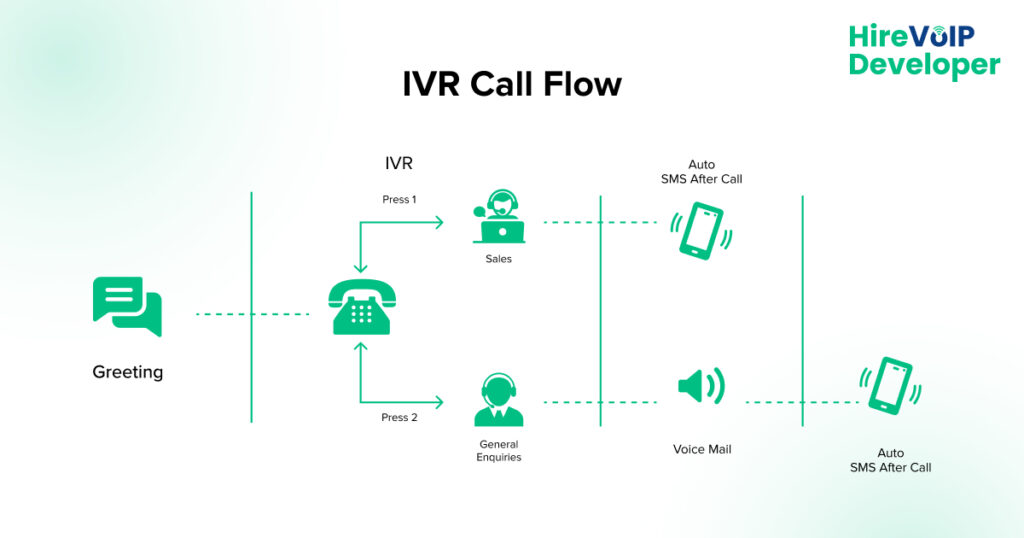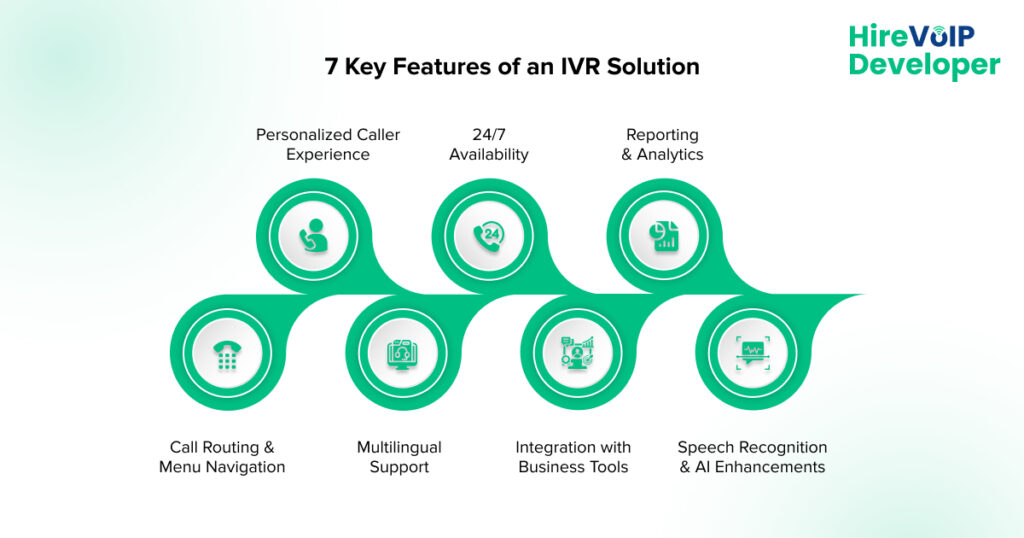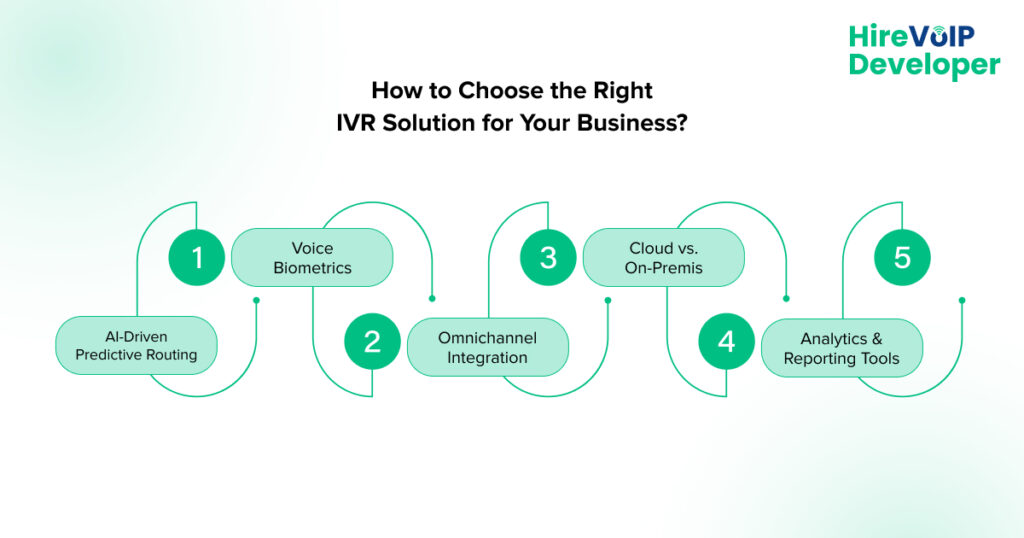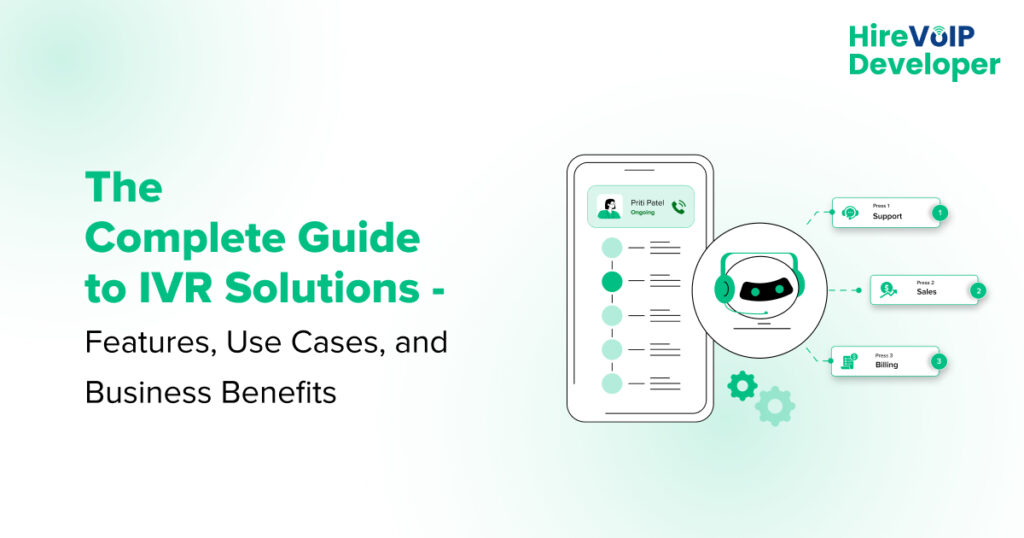🗝️ Key Highlights
- Explore what IVR solutions are, their evolution, and must-have features like call routing, AI, and multilingual support.
- Discover real-world use cases from customer support to payments, surveys, and enterprise IVR migration testing systems.
- Learn the business benefits of cloud-based IVR solutions, how IVR improves efficiency, and tips to choose the right provider.
It’s 8:45 PM. Your customer’s internet connection just went down, and they need help, fast. Instead of waiting until business hours, they dial your helpline and are instantly greeted by a friendly automated voice:
“Welcome to StarConnect Support. For troubleshooting, press 1.”
In less than two minutes, their issue is logged, and they receive a reset link. No waiting. No frustration.
This is the power of a custom Interactive Voice Response (IVR) system, a system designed to assist, route, and resolve calls efficiently, even when your team is off the clock. Over the years, IVR has evolved from robotic, push-button menus into AI-powered, conversational experiences that feel more human and intuitive. In this IVR solutions guide, we’ll explore its features, real-world use cases, and the business benefits it brings, along with tips on choosing the right solution for your needs.
What is an IVR Solution?
Before diving into features and benefits, let’s start with the basics: what exactly is an IVR solution, and why is it so critical for modern businesses?
An IVR solution, short for Interactive Voice Response, is an automated telephony system that interacts with callers through voice menus, keypad inputs, or even conversational AI. Instead of waiting on hold for a live agent, customers can quickly navigate menus, access information, or be routed to the right department. In short, IVR is the backbone of customer communication, balancing efficiency with accessibility.

Here’s how it works in practice: when a customer calls, the telephony system picks up the connection, voice prompts guide them through menu options, the routing logic decides where to direct the call, and integrations connect with backend tools like CRM integration, ERPs, or ticketing systems to provide personalized assistance.
There are two broad categories:
- Single-level IVR: A basic system with a flat menu structure, simple but limited.
- Multi-level IVR solutions for businesses: A more advanced setup that allows deeper menu layers, department-specific routing, and greater flexibility for enterprises handling large call volumes.
Over time, IVR has evolved dramatically. What started as clunky, push-button menus has now transformed into AI-enabled and cloud-based IVR solutions. These modern platforms offer speech recognition, natural language processing, and predictive routing, making conversations smoother and more human-like. Enterprises considering IVR migration testing systems often make this move to cloud IVRs for scalability and long-term ROI.
Now that we understand what IVR is, let’s break down the core features that make it such a powerful tool for business communication.
7 Key Features of an IVR Solution
The strength of an IVR lies in its features. The right set of tools can transform customer interactions from frustrating to seamless.

Here are the most impactful features every business should look for:
1. Call Routing & Menu Navigation
This is the foundation of any IVR/auto attendant solution for your business. A well-designed IVR ensures that calls are routed to the right department the first time. Multi-level menus make navigation simple for customers with complex queries, while skill-based routing directs them to agents best equipped to handle their concerns. Add self-service options, and customers can resolve common issues instantly, without waiting in a queue.
2. Personalized Caller Experience
Customers love feeling valued. With CRM data integration, IVRs can greet callers by name, remember past interactions, and offer tailored solutions. This personalization is a game-changer for enterprise IVR systems, ensuring smooth experiences for repeat customers and new callers alike.
Did you know?
People talk to IVRs like they’re human, saying “thank you” or even arguing when it doesn’t understand (and yes, the IVR still doesn’t care).
3. Multilingual Support
Global businesses can’t afford language barriers. Cloud-based IVR solutions often come with multilingual capabilities, ensuring callers get assistance in their preferred language. This not only improves accessibility but also enhances brand trust worldwide.
4. 24/7 Availability
One of the greatest benefits of IVR is its always-on nature. Customers no longer need to wait for business hours; they can access services, make payments, or check information at any time of day. This is particularly valuable for enterprises looking to enhance service without hiring night-shift teams.
5. Integration with Business Tools
A truly effective IVR isn’t a standalone system; it’s a connected hub. From CRMs and ERPs to payment gateways and ticketing systems, integrations make it possible to pull up account details, verify payments, or log service requests instantly. This connectivity shows how IVR improves efficiency across departments.
6. Reporting & Analytics
A modern IVR solution guide isn’t complete without analytics. Detailed reports on call volumes, peak times, resolution rates, and customer drop-offs provide businesses with actionable insights to refine their workflows.
7. Speech Recognition & AI Enhancements
Gone are the days of pressing “1” or “2” endlessly. With voice commands, NLP (Natural Language Processing), and predictive routing, customers can simply say, “Check my order status,” and the system takes care of the rest. This AI-driven approach elevates the customer journey and maximizes the ROI of IVR systems.
These features make IVR not just a call-handling system, but a full-fledged customer engagement platform. Next, let’s explore the different types of IVR solutions businesses can implement.
Ready to unlock the benefits of tailored IVR solutions for your businesses?
Types of IVR Solutions
Not all IVRs are created equal. The right type of system depends on your business needs and customer expectations.
1. Inbound IVR
Designed to manage incoming calls, inbound IVRs are what most people think of when they imagine an IVR. They handle queries like order status, technical support, or billing information. For enterprises, this often includes multi level IVR solutions for businesses that can sort thousands of calls daily.
2. Outbound IVR
Outbound systems proactively reach customers. Whether it’s sending payment reminders, conducting surveys, or launching marketing campaigns, outbound IVRs save businesses significant time while boosting engagement.
3. Visual IVR
A newer, customer-friendly twist. Visual IVRs allow customers to interact with IVR menus on their smartphones or devices rather than through voice alone. This reduces frustration and improves accessibility, especially for tech-savvy users.
By choosing the right type, companies ensure their IVR not only supports but actively enhances their communication strategy. Now, let’s look at how these systems are applied in real-world scenarios.
Common Use Cases of IVR Solutions
So, how do businesses actually use IVR in their day-to-day operations? Let’s explore some practical, real-world applications that show just how versatile this technology really is.
1. Customer Support & Self-Service
This is by far the most common application of IVR. Instead of waiting on hold, customers can use automated menus to check account balances, reset passwords, track orders, or even troubleshoot simple issues. For example, an internet service provider can let customers run diagnostics or reset their router through IVR, saving both the customer and the support team valuable time. This is where IVR/auto attendant solutions for your business shine: they filter queries so that only complex issues reach live agents.
2. Appointment Scheduling & Reminders
Hospitals, clinics, beauty salons, and service-based businesses depend heavily on IVRs to manage appointments. Customers can book, reschedule, or cancel appointments using self-service menus. At the same time, outbound IVR can send automated reminders, reducing no-shows and last-minute cancellations. This automation alone demonstrates how IVR improves efficiency by keeping schedules optimized.
3. Payment Processing & Collection
Billing departments use IVR to streamline payments. By integrating with secure payment gateways, cloud based IVR solutions allow customers to make credit card or UPI payments directly through the phone system. For companies that manage recurring bills, like telecoms, utilities, or SaaS providers, this reduces the burden on staff and ensures collections happen faster.
4. Marketing & Promotions
Outbound IVR campaigns are a cost-effective way to share promotions, product launches, and service updates with thousands of customers at once. Unlike email or SMS, voice campaigns feel more personal and often lead to higher engagement. Businesses leveraging enterprise IVR systems often use this strategy to keep customers informed without overwhelming human agents.
5. Surveys & Feedback Collection
Customer feedback is crucial for growth. Many companies deploy IVR to run post-call surveys or conduct quick polls. For example, after a customer speaks with an agent, the IVR can ask: “On a scale of 1–5, how satisfied were you with today’s service?” This data is invaluable for improving services, training staff, and proving the ROI of IVR systems by showing tangible improvements in satisfaction scores.
| 75% of customers feel frustrated when they can’t reach a live agent, which shows that while self-service is popular, the option for human support remains critical in building trust and loyalty. |
These use cases highlight why IVR is no longer a “nice-to-have” but a must-have. Next, let’s talk about the broader business benefits that make IVR such a smart investment.
Business Benefits of IVR Solutions
IVR isn’t just about answering calls; it’s about transforming how businesses operate. Let’s break down the key benefits companies experience when they adopt modern IVR systems.
1. Cost Savings
By automating routine interactions, companies dramatically reduce the need for large support teams. For example, a bank handling thousands of daily calls can automate balance checks, freeing agents to focus on high-value interactions. This efficiency directly impacts the bottom line, proving the ROI of IVR systems over time.
2. Improved Customer Experience
Nothing frustrates a customer more than long wait times or being transferred from one department to another. With enterprise IVR solutions, callers are routed correctly the first time, reducing frustration. Add AI-driven personalization, and customers feel truly valued, an experience that boosts loyalty
3. Scalability & Flexibility
Businesses face fluctuating call volumes, peak hours, seasonal spikes, or sudden demand surges. With cloud based IVR solutions, companies can scale capacity instantly without adding extra infrastructure or staff. This scalability ensures no call goes unanswered, even in busy periods.
4. Increased Productivity
When routine queries are handled automatically, agents spend more time resolving complex issues. This balance means higher productivity for staff and fewer bottlenecks in call centers. It’s a clear example of how IVR improves efficiency by optimizing human resources.
5. Enhanced Brand Image
Professional, smooth IVR systems give callers the impression of a reliable and modern company. Think about it: when customers call and are greeted with clear menus, quick solutions, and multilingual support, they immediately associate the brand with competence and care. This intangible benefit builds trust and strengthens reputation over time.
With so many advantages, it’s clear why businesses across industries, from telecoms to healthcare, are adopting IVR. But with so many options out there, how do you choose the right one?
Let’s find out.
How to Choose the Right IVR Solution for Your Business?
Selecting the right IVR is a strategic decision. A poorly designed system can frustrate customers, while the right one can boost efficiency and deliver impressive ROI.

So, what should you look for?
1. AI-Driven Predictive Routing
This is a must-have for modern businesses. Predictive routing uses past interactions, customer intent, and agent skills to connect callers to the right resource instantly. For example, if a customer frequently calls about billing, the system learns this pattern and routes them directly to finance. This shows how IVR improves efficiency by eliminating unnecessary steps.
2. Voice Biometrics
Security is critical, especially when dealing with sensitive data like banking details. Enterprise IVR systems increasingly use voice biometrics to authenticate customers. Instead of answering security questions, the caller’s voiceprint verifies their identity, faster and more secure.
3. Omnichannel Integration
Today’s customer doesn’t stick to one channel. They might start with an IVR call, switch to live chat, and follow up via email. A strong IVR must integrate with these channels for seamless continuity. This is particularly valuable for businesses investing in multi-level IVR solutions for businesses, as it allows consistent customer journeys across platforms.
4. Cloud vs. On-Premise
When evaluating IVR solution providers, one major decision is whether to choose a cloud system or on-premise setup. Cloud-based IVR solutions usually offer faster deployment, better scalability, and lower maintenance costs, while on-premise might appeal to companies needing full control. Enterprises planning an IVR migration testing system often switch to cloud models for future readiness.
5. Analytics & Reporting Tools
Finally, choose a solution that provides detailed insights. From call volumes and average handling times to customer satisfaction ratings, analytics demonstrate the real ROI of IVR systems and help fine-tune strategies over time.
When chosen wisely, an IVR isn’t just a support tool; it becomes a strategic asset. The right system drives cost savings, boosts satisfaction, and scales with your growth.
| 30% of service costs can be saved with IVR, as automation takes over repetitive queries, letting human agents focus on complex and high-value interactions. This not only saves money but also improves agent productivity. |
🔍 Choose the Right IVR Provider Today!
Wrapping Up
IVR technology has truly transformed how businesses interact with their customers. From simple push-button systems to AI-powered, cloud-based IVR solutions, it has evolved into a critical tool that balances cost-efficiency with exceptional customer experience. Whether you’re aiming to reduce wait times, improve satisfaction, or scale your operations, the benefits of IVR are hard to ignore. The right system not only enhances efficiency but also directly impacts your bottom line, proving the long-term ROI of IVR systems.
For businesses considering modern IVR adoption, here are three key takeaways:
- ✅ Choose a provider that offers AI, multilingual, and omnichannel features for future readiness.
- ✅ Look for multi-level IVR solutions for businesses that can adapt to your call volumes and workflows.
- ✅ Use analytics and reporting features to continuously refine customer journeys and see how IVR improves efficiency over time.
And here’s something many businesses overlook: having the right technology is only half the story. To unlock the full potential of your IVR, you need someone who can customize, integrate, and optimize it to match your workflows.
That’s where Hire VoIP Developer makes the difference. With proven expertise in building tailored VoIP and IVR solutions, our team helps businesses implement smart, scalable, and future-ready systems. Whether you need enterprise-grade IVR, cloud-based deployment, or AI integration, Hire VoIP Developer ensures your solution is robust, reliable, and aligned with your business goals. Partner with us to take your customer experience to the next level.


